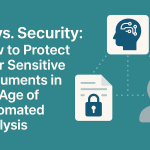Overview
Trust accounting represents an essential financial practice for legal professionals, demanding meticulous handling, recording, and reporting of client funds to ensure compliance and foster client trust. Understanding this discipline is paramount for attorneys, as it not only helps them avoid severe penalties but also enhances operational integrity. Effective financial management directly influences client relationships and the firm’s reputation, making it imperative for legal practitioners to master trust accounting.
Introduction
In the intricate world of legal practice, trust accounting serves as a cornerstone of ethical responsibility and client confidence. Legal professionals navigating the complexities of managing client funds must recognize the paramount importance of maintaining transparency and compliance. Alarmingly high rates of non-compliance and ethical breaches underscore the critical need for robust trust accounting practices.
As firms increasingly leverage technology to streamline operations and enhance accountability, a comprehensive understanding of trust accounting nuances becomes essential for safeguarding client interests and upholding the integrity of the legal profession.
This article explores the fundamental principles, challenges, and best practices of trust accounting, providing insights into how legal practitioners can effectively manage their fiduciary duties in a rapidly evolving landscape.
Understanding Trust Accounting: Definition and Importance
Understanding trust accounting is essential for effective trust management, encompassing the specific financial practices attorneys must adhere to when handling funds on behalf of others. This requires meticulous handling, recording, and reporting of all transactions associated with these funds. Trust funds play a critical role in safeguarding client assets and ensuring that resources are utilised solely for their intended lawful purposes.
For attorneys, grasping the nuances of trust accounting is paramount in fiduciary financial management. This understanding is crucial not only for ensuring regulatory compliance but also for fostering confidence and transparency with clients. Recent statistics reveal that 40% of compliance leaders prioritise strengthening third-party risk management processes, underscoring the increasing focus on secure financial practices within the industry.
Moreover, 35% of business and tech leaders regard third-party breaches as one of the most pressing cyber threats, highlighting the urgent need for robust financial oversight practices to mitigate such risks. Additionally, non-compliance with financial oversight principles can result in severe judicial repercussions, including disbarment and substantial monetary penalties. As the landscape of regulatory adherence evolves, it is vital for attorneys to stay informed about trust accounting and the accompanying fiduciary financial regulations.
A survey conducted in February 2024 indicated that 61% of corporate risk and compliance professionals identified staying updated on regulatory changes as a top strategic priority for the upcoming 12 to 18 months. This aligns with the finding that 67% of global executives perceive ESG regulation as excessively complex, suggesting that attorneys may face similar challenges in compliance that necessitate a solid understanding of fiduciary principles. By 2025, the significance of fiduciary management for attorneys continues to escalate, with numerous firms recognising its role in enhancing operational integrity and client confidence.
Efficient management of financial records not only mitigates risks but also streamlines fiscal processes, ultimately benefiting both the firm and its clients. Case studies from law offices that have implemented strong financial management practices demonstrate improved compliance and heightened client satisfaction, reinforcing the importance of these practices in today’s legal landscape. The Secureframe User Benefits Survey indicates that organisations prioritising compliance experience significant advantages, which can be mirrored in the legal sector through effective financial management.
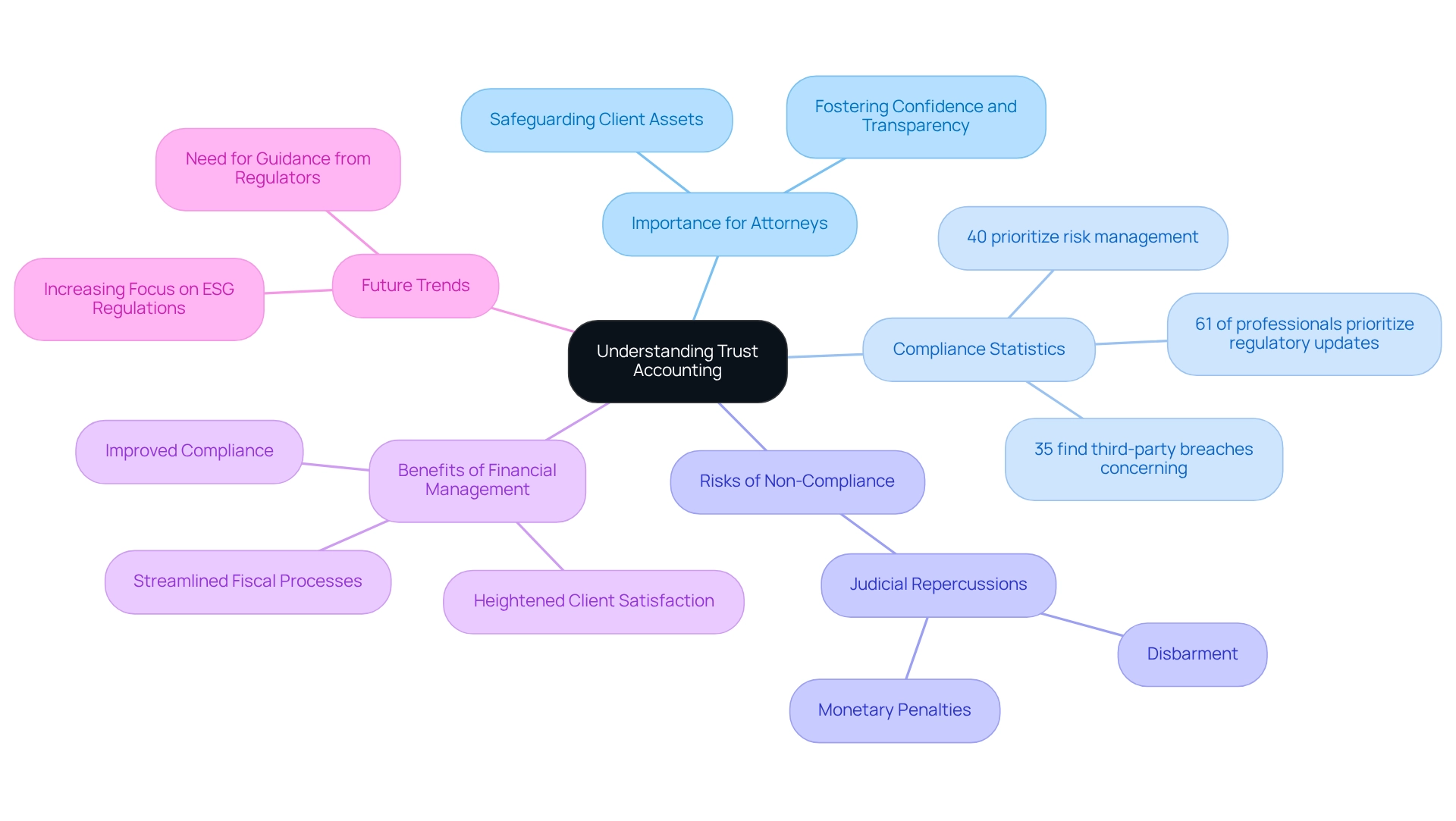
Key Rules and Regulations Governing Trust Accounting
What is trust accounting? It operates within a complex framework of rules and regulations established by the American Bar Association (ABA) and various state bar associations. Among the essential regulations are:
- The strict prohibition against mixing customer funds with personal or business accounts.
- The necessity for maintaining accurate and thorough records of all transactions.
- The requirement for regular reconciliations of fiduciary accounts.
Furthermore, many jurisdictions mandate the use of Interest on Lawyers’ Trust Accounts (IOLTA), ensuring that client funds are managed ethically and transparently.
Statistics reveal that a considerable portion of lawyers encounter challenges in adhering to financial management regulations, with examinations by state bar or governmental agencies frequently uncovering compliance issues. In fact, the ABA has noted that a significant number of attorneys face disciplinary actions due to financial management violations, underscoring the necessity for strict adherence. Recent statistics indicate that approximately 30% of attorneys reported difficulties in maintaining compliance with financial regulations, emphasising the urgent need for effective solutions.
Recent updates to ABA financial management regulations in 2025 further highlight the importance for legal professionals to stay informed about evolving guidelines. Expert insights stress that “financial management is challenging and involves many regulations for which there are severe penalties, so utilising legal-specific tools can greatly simplify the process and assist in mitigating risk.”
Moreover, implementing fraud prevention strategies like the Positive Pay initiative can bolster the protection of funds held in fiduciary management. This programme effectively aids in preventing unauthorized transactions, ensuring that customer funds remain safeguarded.
Case studies illustrate the efficacy of utilising legal-specific tools for financial management. For instance, firms employing software such as Tabs3 Financials have reported enhanced automation of fiduciary practices, reducing human error and fostering a clear and efficient system for managing client fiduciary accounts. By adhering to these regulations and leveraging specialised software, law firms can not only ensure compliance but also improve their operational efficiency, which is essential for understanding trust accounting and maintaining the integrity of their practise.
In Virginia, several service providers collaborate to offer a comprehensive range of solutions that can assist law firms in navigating the complexities of accounting compliance. By utilising these resources, attorneys can gain a better understanding of the compliance landscape and the support available in their region.
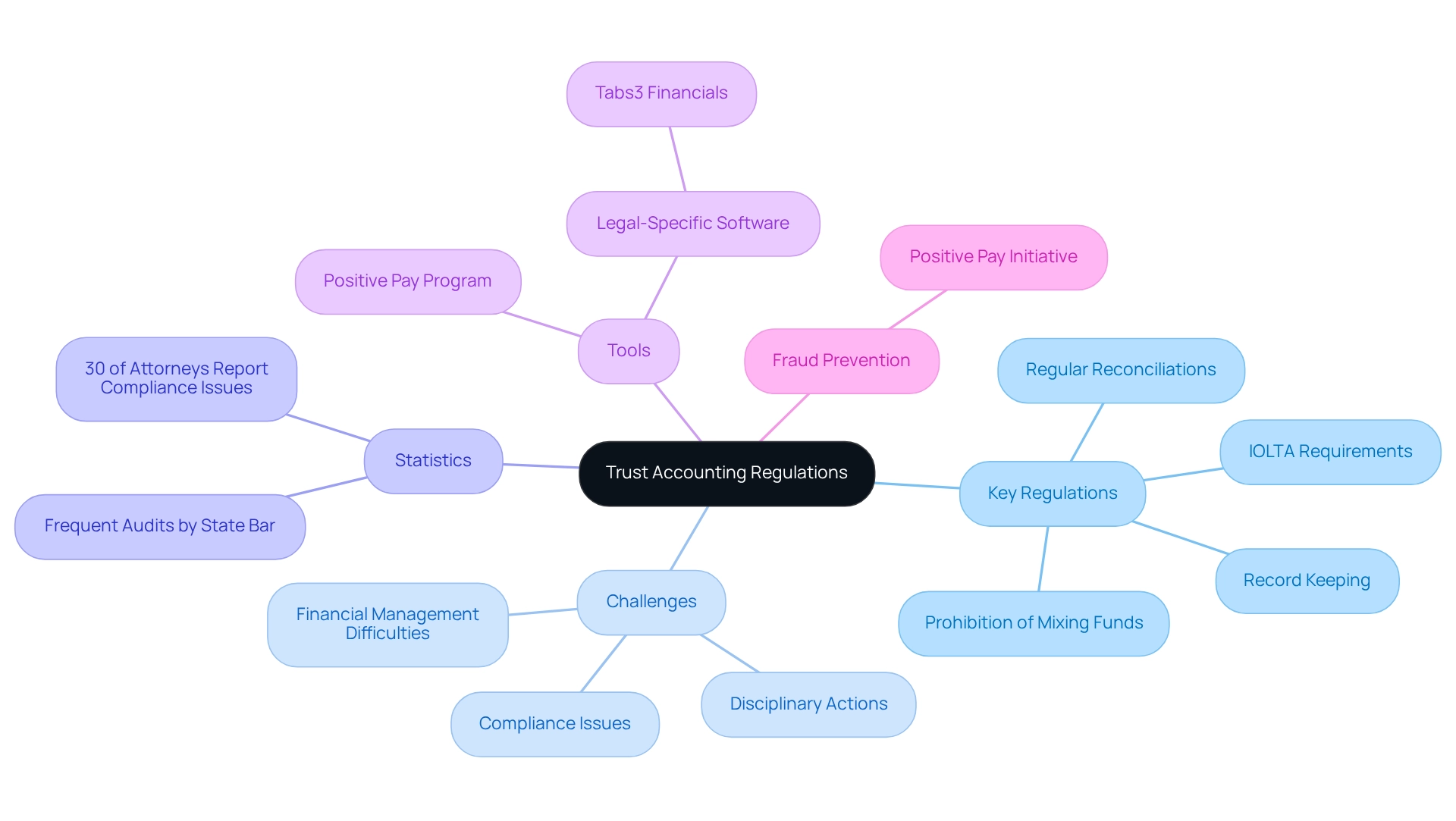
Best Practices for Managing Trust Accounts Effectively
Efficient administration of fiduciary accounts is essential for attorneys, and understanding trust accounting encompasses various best practices. Maintaining distinct ledgers for every client is vital to prevent the frequent breach of mixing client account funds with business accounts, which can lead to significant complications. Regular reconciliations and robust record-keeping systems are crucial to ensure accuracy and compliance with regulations such as IOLTA.
Utilising trust management software like MyDocSafe can significantly enhance these processes by automating transaction tracking and reducing the likelihood of human error. MyDocSafe streamlines operations by providing automated AML/KYC checks and effective document management, ensuring compliance with regulations and safeguarding client funds. The platform’s customisable workflows and paperless quoting process further simplify operations, allowing law firms to tailor their processes to meet specific needs.
Law firms that have adopted MyDocSafe report a notable reduction in financial errors, underscoring the importance of technology in modern practices. With over 10,000 companies worldwide utilising MyDocSafe’s services, the integration of accounting software is increasingly recognised as an essential tool for legal professionals aiming to enhance their operational efficiency and compliance.
Regular training and updates on accounting regulations are imperative to keep all staff informed of their responsibilities. This proactive approach helps mitigate risks associated with account management. Furthermore, transparent communication with clients regarding the management of their funds fosters trust and openness in the attorney-client relationship, which is vital for maintaining professional integrity.
A case study titled ‘Upholding Reliability and Integrity’ illustrates the principles of trust accounting and emphasises the importance of distinguishing between trust accounts and operating accounts. By implementing best practices in financial management and comprehending the fundamentals of trust accounting, law firms can uphold the highest standards of the profession and effectively fulfil their fiduciary duties. Additionally, as Tara Kachaturoff noted, MyDocSafe’s user-friendly interface for managing client contracts and its comprehensive client portal further highlight the platform’s efficiency in aiding professionals with their understanding of trust accounting.
Start a free trial with MyDocSafe today to experience these benefits firsthand.
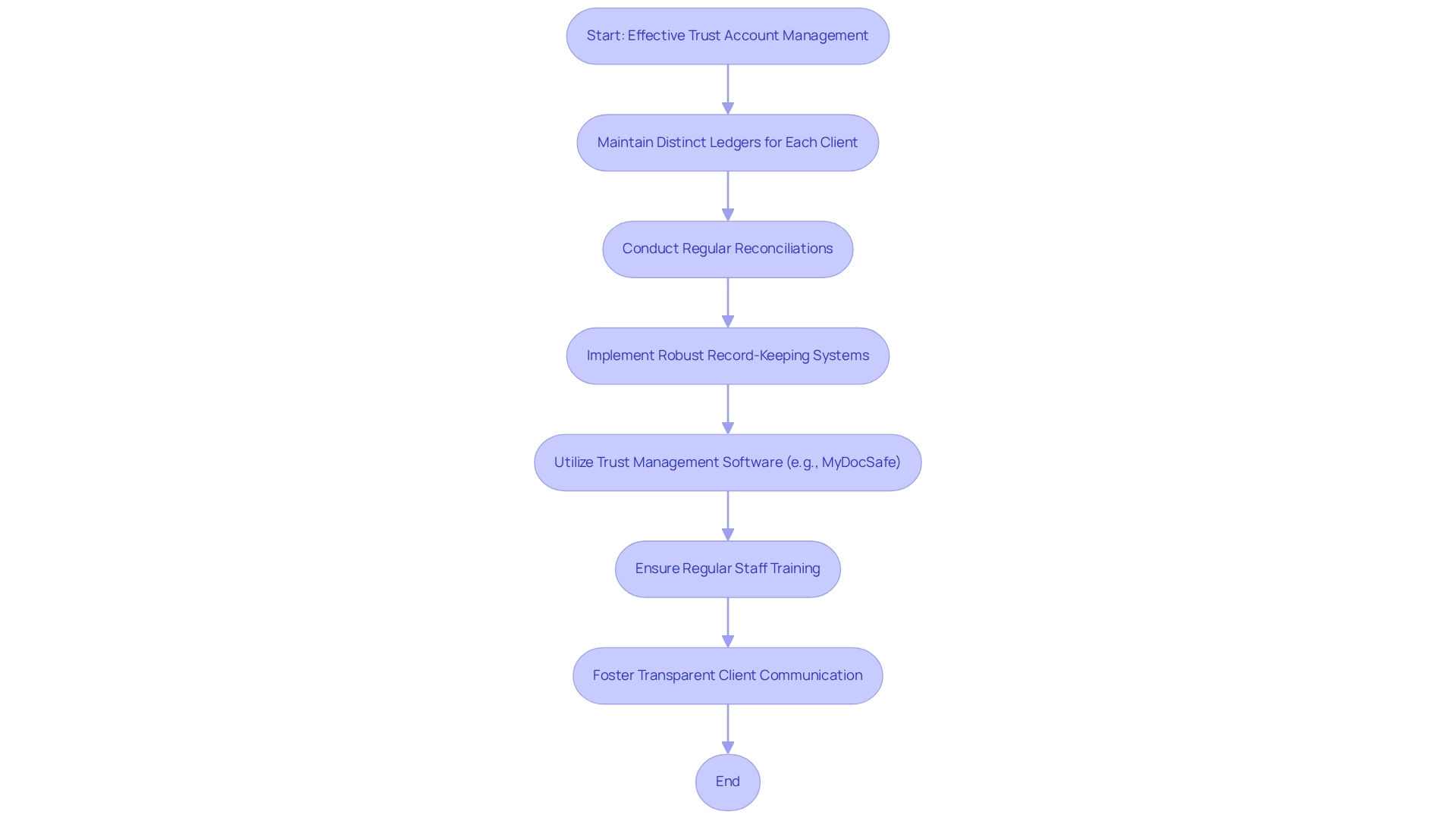
Common Challenges in Trust Accounting and How to Overcome Them
Trust accounting presents several common challenges that law firms must navigate, including the risk of commingling funds, inaccurate record-keeping, and the failure to conduct timely reconciliations. Commingling, in particular, poses significant legal and ethical risks, leading to serious compliance issues and potentially damaging a firm’s reputation. To effectively tackle these challenges, law firms should establish robust policies and procedures for managing client accounts.
This involves conducting regular audits—statistics reveal that only a small portion of law firms engage in these audits, resulting in unnoticed discrepancies.
Utilising specialised financial management software can greatly simplify processes and enhance precision, thereby decreasing the likelihood of human error. Such technology not only automates record-keeping but also facilitates timely reconciliations, ensuring that all transactions are accurately tracked and reported. As Tara Kachaturoff, a user of MyDocSafe, highlights, the platform’s simplicity in managing client contracts can significantly benefit financial management practices.
Moreover, promoting a culture of responsibility within the firm is essential. By ensuring that all team members understand the importance of adhering to financial management standards, firms can mitigate risks associated with mismanagement. Professional guidance suggests that law firms should prioritise training and ongoing education in financial management practices. This proactive approach empowers staff to identify potential issues before they escalate.
Furthermore, case studies demonstrate that firms which have effectively addressed the mixing of funds have implemented rigorous segregation policies and frequent compliance reviews, underscoring the effectiveness of these strategies in maintaining the integrity of fiduciary accounts. The context of financial management trends is further illustrated by the total charitable assets in DAFs at Single-Issue Charities, which amounted to $21.90 billion in 2023, alongside the average DAF account size of $234,674. These figures emphasise the extent of financial oversight that law firms may encounter, highlighting the critical importance of efficient fiduciary management practices.
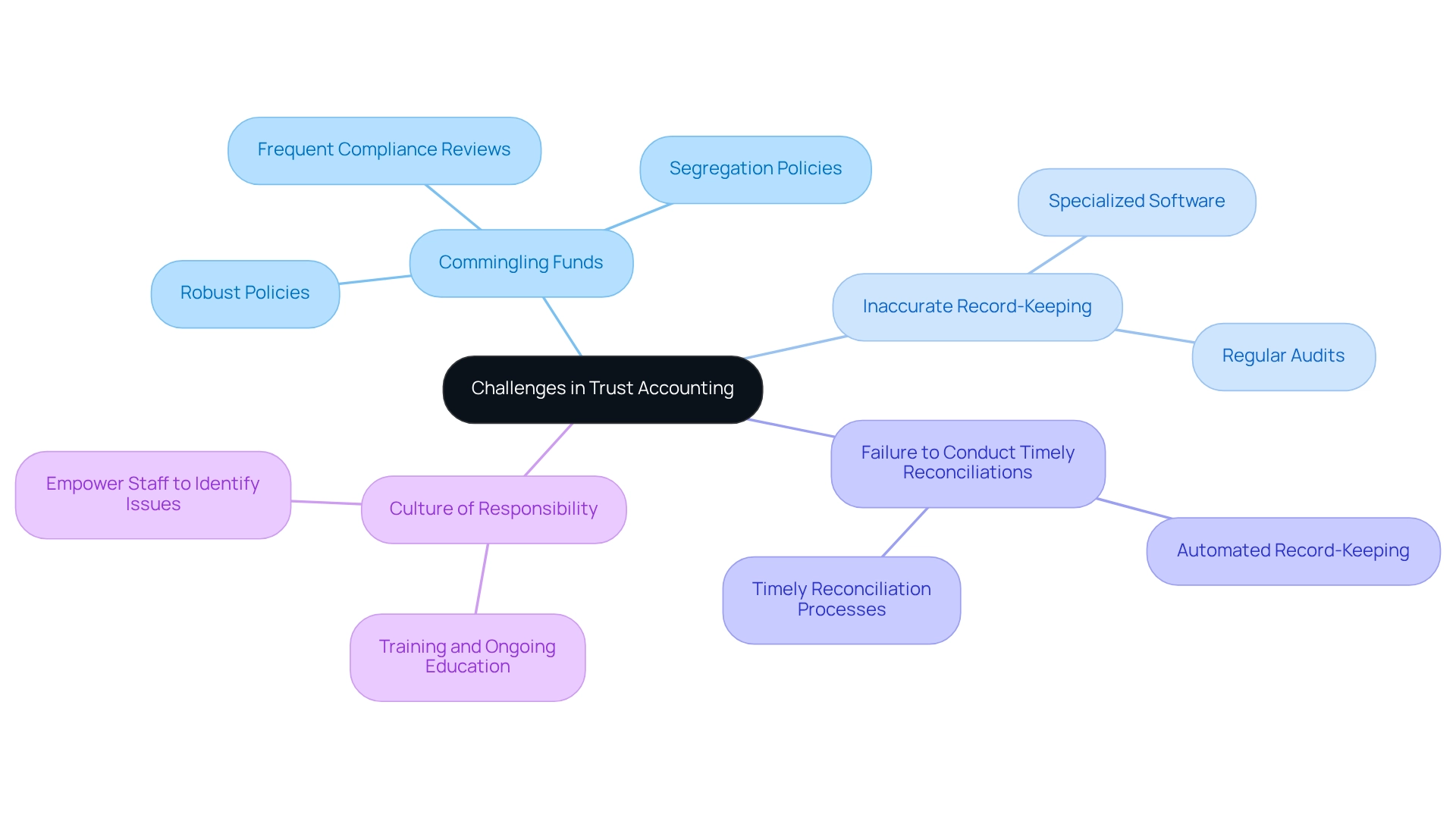
Leveraging Technology: Tools for Efficient Trust Accounting
Technology is revolutionising accounting practices in the judicial field, enabling professionals to streamline operations and enhance compliance. MyDocSafe, a leader in document management and electronic signature software, empowers legal firms to automate transaction tracking, generate comprehensive reports, and seamlessly adhere to regulatory standards. Its features, including customisable user portals, advanced e-signatures, and integrations with platforms like Xero and Salesforce, significantly mitigate the potential for errors while enhancing transparency in managing fiduciary accounts.
The adoption of technology in trust accounting is on the rise, with over 10,000 companies worldwide utilising MyDocSafe to enhance their document management and customer engagement processes. This trend signifies a broader movement within the judiciary sector toward digital solutions that promote efficiency and accuracy. As Tara Kachaturoff noted, MyDocSafe provides ‘ease of use for managing contracts,’ a vital aspect for professionals striving to maintain compliance while delivering exceptional service.
MyDocSafe’s signature generator is pivotal in optimising document management and professional communication, ensuring firms can effectively manage customer onboarding and document distribution. The platform’s automated workflows and security features bolster operational efficiency and user engagement, rendering it an invaluable asset for legal practitioners. Furthermore, best practices for document signatures, as outlined in user manuals, underscore the significance of compliance and efficiency in document management.
As we approach 2025, the market for financial management software continues to expand, with companies increasingly recognising the importance of these tools in ensuring compliance and enhancing operational efficiency. Professional insights highlight that the benefits of accounting software extend beyond mere compliance; they also elevate customer satisfaction through improved communication and transparency. Reviews of MyDocSafe indicate a growing preference for its robust features and intuitive interface, ensuring that legal professionals can manage their trust accounts efficiently, all while focusing on delivering outstanding service to their clients.
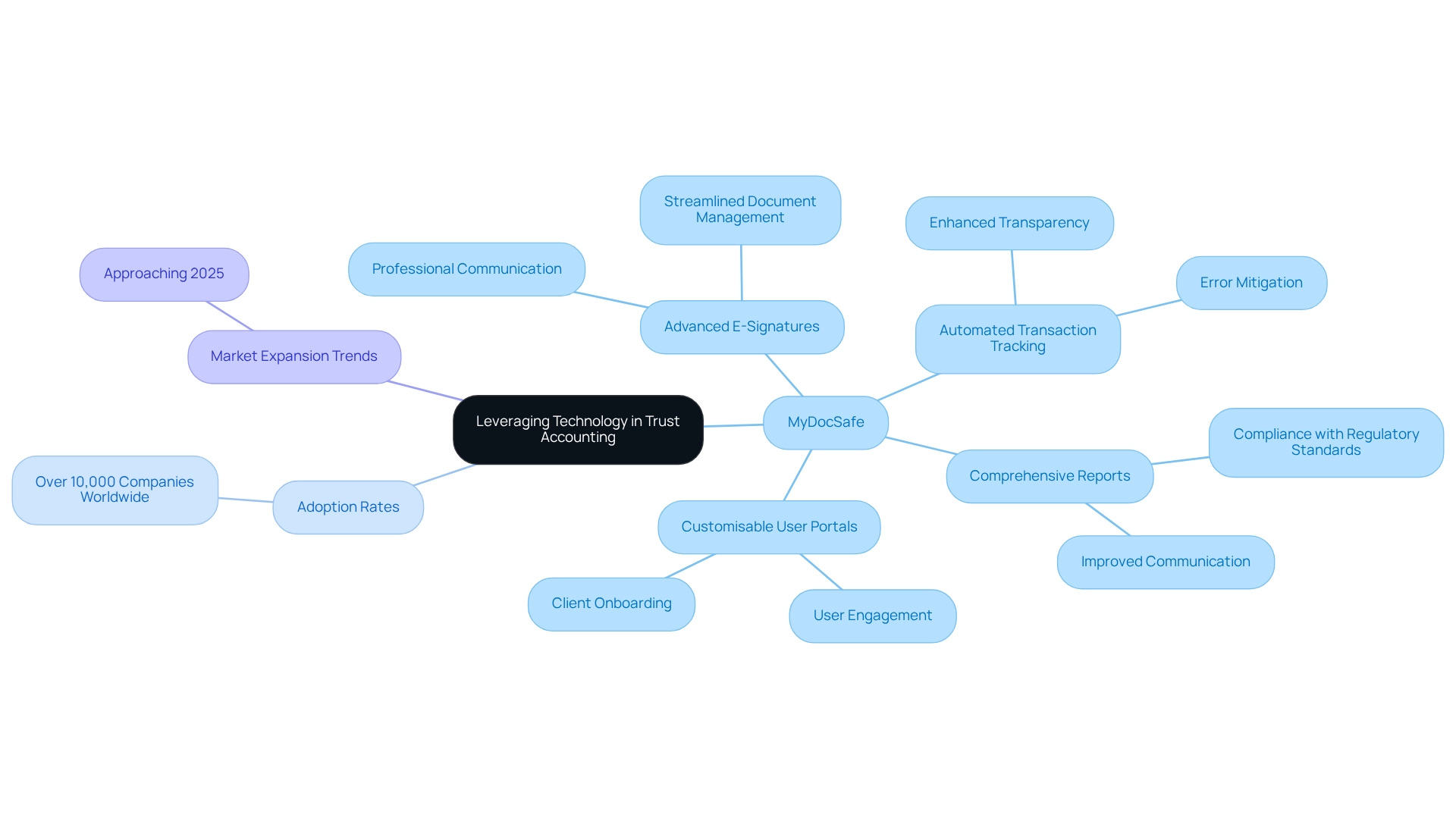
Ethical Responsibilities in Trust Accounting: Ensuring Transparency and Accountability
Legal professionals bear a critical fiduciary duty to manage funds belonging to individuals with exceptional care and integrity, underscoring the importance of understanding what is trust accounting. This responsibility encompasses precise transaction documentation, safeguarding against misappropriation, and ensuring transparent communication with clients regarding their accounts. Clarity is pivotal in this process; attorneys must educate their clients about what is trust accounting by providing regular account statements and transparently disclosing any fees or charges related to their services.
In 2025, the significance of what is trust accounting is further emphasised through the ethical obligations inherent in fiduciary management, which necessitate meticulous record-keeping and regular reconciliation, as illustrated in a case study on best practices for fiduciary account management. This research demonstrates that adopting such practices not only aids law firms in complying with IOLTA regulations but also enhances financial management, thereby illustrating what is trust accounting. By fulfilling these ethical responsibilities, attorneys protect their clients’ interests and ensure they comprehend what is trust accounting, thus preserving the profession’s integrity.
Moreover, data reveals that a substantial number of ethical violations in accounting stem from a lack of transparency, highlighting the critical need to grasp what is trust accounting. In fact, 67% of global executives contend that complex ESG regulations contribute to these challenges, indicating an urgent necessity for law firms to recalibrate their performance metrics to prioritise ethical outcomes over mere financial results. These complexities can hinder legal practices, making it imperative for firms to understand what is trust accounting and adopt clearer, more transparent processes.
Expert insights affirm that comprehending what is trust accounting is essential for ensuring openness in fund management, significantly influencing client satisfaction in legal services. Law firms that embrace transparent practices not only bolster their reputation but also foster trust and loyalty among clients, raising the question of what is trust accounting in relation to enhanced engagement and retention. Platforms such as MyDocSafe are recognised for their advanced document management and electronic signature solutions, which streamline user onboarding and enhance engagement.
By utilising MyDocSafe, professionals can refine their document management processes, ensuring they uphold transparency and efficiency in financial management while adeptly handling sensitive client information. Testimonials from MyDocSafe users underscore the platform’s effectiveness in securely storing and sharing sensitive documents, automating onboarding processes, and seamlessly integrating with other tools. Furthermore, MyDocSafe’s encrypted document management and data security features ensure that professionals can manage sensitive information with confidence, further enhancing their ability to maintain transparency and reliability with their clients.
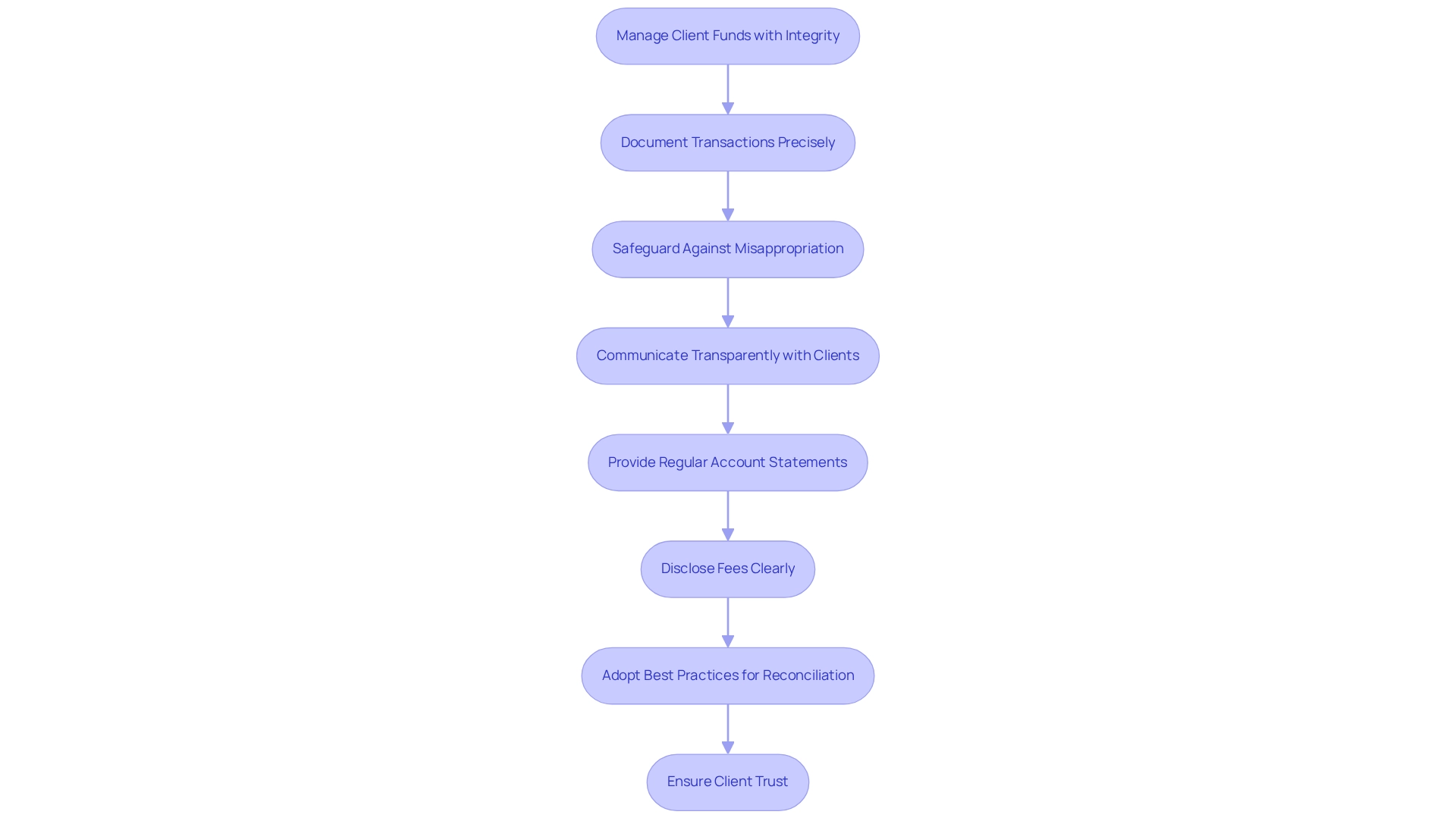
The Significance of Trust Accounting in Legal Practice
Trust management serves as a crucial foundation of ethical professional practice, ensuring that funds are managed with the utmost responsibility and transparency. This practice is essential for fostering confidence between lawyers and their clients, a cornerstone for nurturing long-term professional relationships. Data indicates that a significant loss of clients can occur when lawyers face disciplinary actions for commingling funds, underscoring the importance of maintaining a clear separation between fiduciary accounts and operational accounts.
Moreover, adhering to fiduciary management principles is vital not only for ethical standards but also for compliance with regulatory requirements. This adherence protects both clients and lawyers from potential legal repercussions. As highlighted in the case study ‘Best Practices for Maintaining Separate Accounts: Protecting Customer Confidence,’ law firms that implement effective strategies can uphold ethical standards while safeguarding their clients’ interests.
As we advance into 2025, the ongoing digital transformation continues to reshape the legal landscape, making the understanding and execution of effective fiduciary management practices increasingly critical. The integration of technology in financial accounting simplifies processes and enhances transparency and accountability, thus strengthening client relationships. Legal professionals who embrace these innovations, such as those offered by MyDocSafe—utilised by over 10,000 businesses worldwide—are better positioned to build trust and ensure compliance, ultimately enhancing their practice’s integrity and reputation.
MyDocSafe’s advanced document management and electronic signature solutions provide secure storage and sharing of sensitive client documents, ensuring that all transactions are legally compliant and efficiently managed. Employing top-tier encryption standards and sophisticated e-signature verification technology, MyDocSafe enhances the security and legality of document transactions. As Tara Kachaturoff noted, MyDocSafe delivers ‘ease of use for managing contracts,’ making it an invaluable resource for professionals navigating the complexities of trust accounting.
With features like automated client onboarding processes and seamless integration with popular platforms such as Xero, Salesforce, Stripe, and Dropbox, MyDocSafe enhances client engagement and streamlines workflows, allowing legal firms to concentrate on their core competencies.
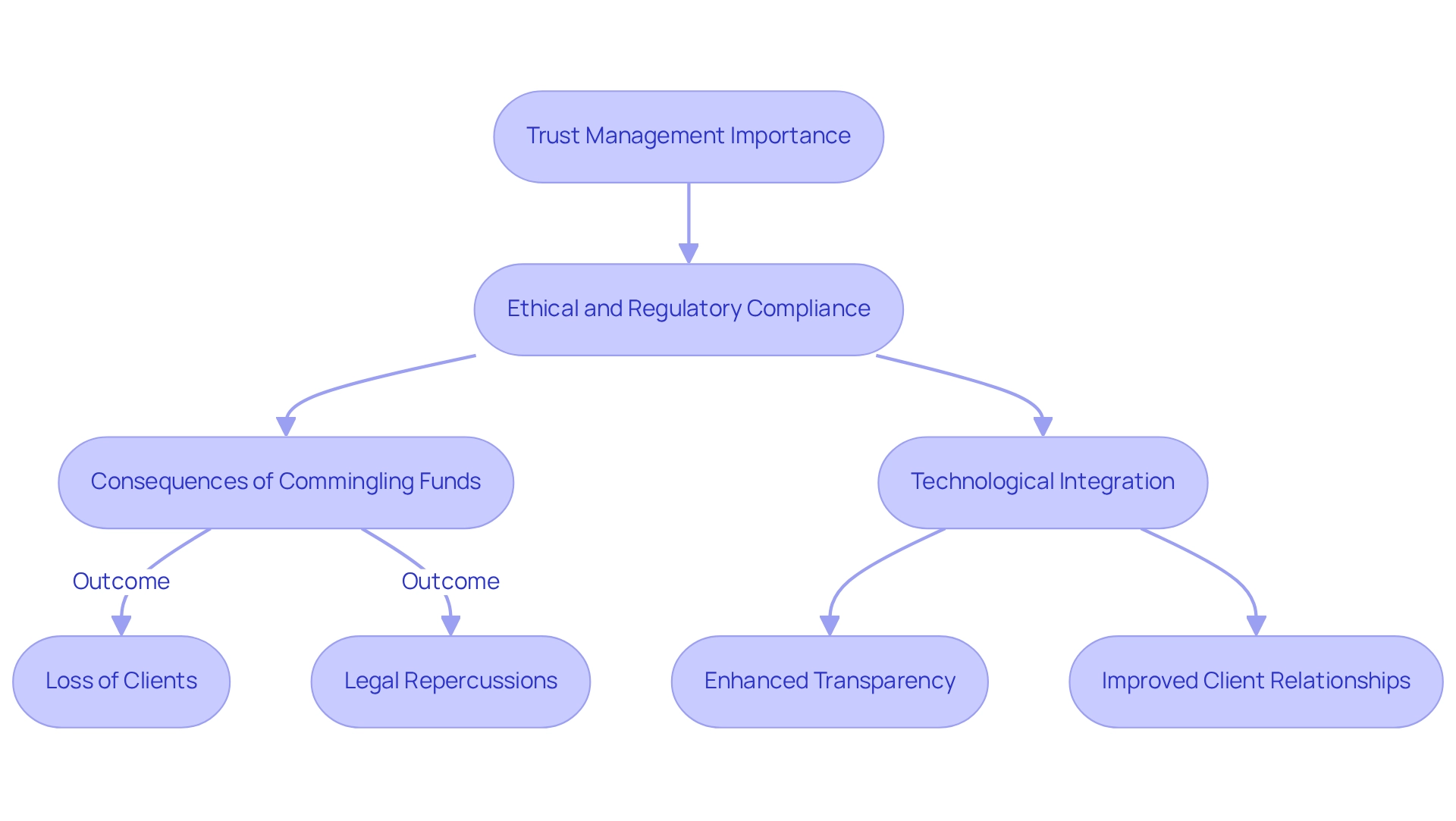
Conclusion
Trust accounting transcends mere regulatory obligation; it is a cornerstone of ethical legal practice that fortifies the bond between attorneys and their clients. The diligent management of client funds, adherence to legal standards, and the application of best practices are crucial for cultivating trust and sustaining a robust professional reputation. As emphasized throughout this article, the complexities of trust accounting can be effectively navigated through the integration of technology, compliance with established regulations, and a steadfast commitment to transparency.
Legal professionals must acknowledge the pivotal role that trust accounting plays in protecting client interests and maintaining the integrity of their practice. Given the escalating intricacies of compliance requirements and the potential ramifications of non-compliance, it is essential for firms to adopt a vigilant and proactive stance toward trust accounting. The utilization of specialized software solutions, such as MyDocSafe, can streamline processes, minimize errors, and bolster accountability, enabling legal practitioners to concentrate on delivering exceptional service while ensuring compliance.
As the legal landscape continues to evolve, embracing technology and best practices in trust accounting not only mitigates risks but also enhances client satisfaction and loyalty. By prioritizing ethical responsibilities and transparency in the management of client funds, legal professionals can strengthen their relationships with clients and ultimately reinforce the trust that is vital to their practice. A commitment to robust trust accounting practices represents a crucial investment in the future of the legal profession, ensuring that attorneys can adeptly navigate the complexities of their fiduciary duties with both effectiveness and ethics.


